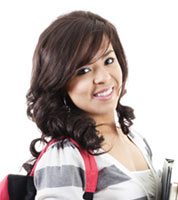Transition Planning and the IEP
Case Studies: Determine the Extent and Type of Transition Services Needed
Each case study provides an example of a set of transition services that directly support the associated postsecondary goal. These examples are not meant to suggest that these are the only or priority transition services. Instead, they offer a sample of how services might be identified and aligned to identified needs of the postsecondary goal.

Robert
Overview of postsecondary goals:
"Robert will independently work part-time in a body shop making car repairs, attend adult education classes in the community, and plans to move to his own apartment.
Team discussion determined that Robert's transition services should include assessment to determine his current level of skill in the area of auto repair, as well as his ability to transfer his study skills to the adult education environment. He will require instruction in social skills in order to interact effectively with coworkers and customers. Robert also needs to gain understanding of the aspects of adult education that may be different from high school. Although Robert demonstrates some daily living skills, he will need instruction in this area so that he can become independent and competent to achieve his postsecondary goals. Following are some of the specific transition services that the team felt would address these needs.
Transition Services
Employment:
-
Assistance to access and create an Ohio Means Jobs backpack and to select and navigate through surveys and information about automotive jobs and skills.
-
Vocational assessment to determine current abilities in the area of car repair and related skills
-
Job shadowing/work experience in an auto body shop to assess his ongoing interest and improve skills related to community employment and auto mechanics
-
Specialized instruction in social competency related to interactions with supervisor, coworkers and customers.
Education:
-
Instruction in how to identify adult classes, register and travel to the class in a timely manner.
-
Community experience to take an adult education class to become familiar with the location, the pace and structure of the courses and to apply study and social skills.
Independent Living:
-
Daily living skills training by participation in a life skills class.

Antonio
Overview of postsecondary goals:
"After high school and college graduation, Antonio will attend a four-year college and then work in the field of aerospace engineering, plastics and polymer manufacturing or pharmaceuticals. He plans to live in the dorms and then independently in his own apartment."
Antonio's team determined that his transition services should include experiences that provide additional assessment as well as improve his skills related to his adult goals.
Transition Services
Employment:
-
Community experiences/shadowing of chemical engineer to confirm career direction.
Education:
-
Related service for an assistive technology assessment related to accommodations for college courses, community experiences visiting campuses.
Independent Living:
-
Community experiences visiting dorms and planning an overnight experience.

Carla
Overview of postsecondary goals:
"Following high school, Carla will work part-time in a community setting with support in an area of interest and skill. She will receive on-the-job training for her employment and also instruction in daily living skills. She plans to move from the family home to a supported residential home when the appropriate supported and individualized setting is available. During planning, the team determined the need for more information related to how well Carla was able to use her skills in the community and potential supports or accommodations she could use in adult life.
Transition Services
Employment:
-
Assistance to access and create an Ohio Means Jobs backpack and to select and navigate through surveys and information to identify interests, skills and preferences related to employment
-
Community work experiences in areas of interest and potential work/volunteer opportunities
-
Functional vocational assessment
-
Assistive technology assessment
Education:
-
On-the-job instruction in community work experiences.
Independent Living:
-
Life skills instruction
-
Community experiences in residential and leisure opportunities to assess future needs